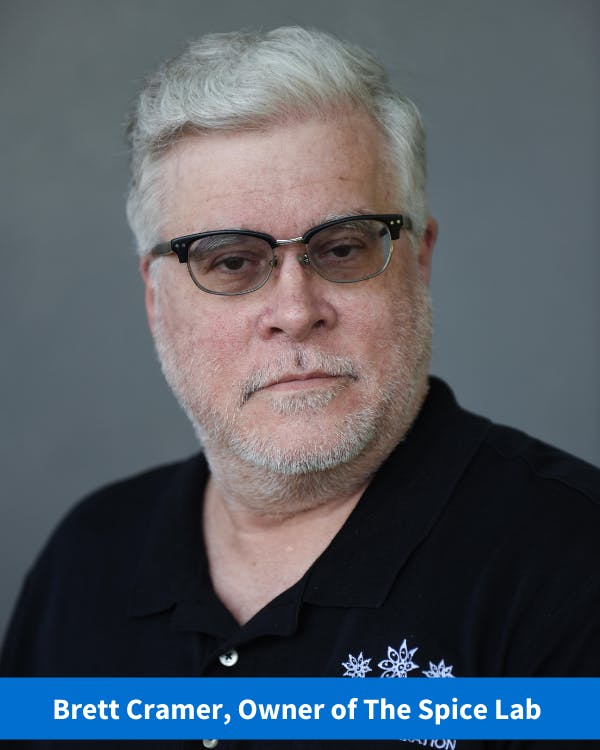According to the Private Label Manufacturers Association, sales of supermarkets’ private label products are up 13.2%.
Grocery stores’ private offerings constituted 23.4% of all units sold for the 52 weeks ending December 26, 2020, according to Chicago-based market researcher NielsenIQ. These numbers show that there is a great opportunity for small brands to get into the private label game.

But while it looks simple—private label = lower price—it’s not always that easy to get into a retailer’s private label portfolio.
Brett Cramer, owner of The Spice Lab, Pompano Beach, Florida, which produces spices and spice blends for many large and small grocery chains, got into it by chance. Two years ago, a retailer asked the 11-year-old company if it would produce a line of spices to run under its private label.
By the end of the first year, The Spice Lab’s private label business had doubled, and now it’s up 40% from a year ago. Currently, 30% of Cramer’s business is private label, and he expects it to be closer to 70% by early 2022.
The Spice Lab provides quality spices and doesn’t compete on price. “Private label done the right way can be a gigantic value-add for merchants,” Cramer says. “It’s better to have a higher quality product that people will come back and buy again and again.”

Here’s are some tips on how you can get into private label products:
Who should you contact?

Marc-André Lamy is the founder of EMMA Marketing in Quebec, Canada, and has launched many grocery store private label products working with Unilever, Kraft, and many small brands.
Typically, he says, retailers approach brands first about creating private label products. But it certainly doesn’t hurt for brands to let them know they’re open to doing so. Big chains have entire departments dedicated to their private label inventory so it is recommended to contact the person responsible for sourcing new products.
“Retailers know precisely the status of a category—whether it’s saturated or not—and will only invest if all the parameters, margins, demand, and size of the category are worth investing time and money in,” Lamy points out.
Why compete with yourself?
It seems counterintuitive to launch a private label product in a category in which you already sell your own goods, but it isn’t. “Consumers love choice. And if you have competition you can grow your brand,” says Lamy.
Do you have to change your recipes?
Sometimes, though these tweaks can be minor, such as altering the spice ratios.
You also need to ensure your product is cheaper than the market leader. “Private label works by being good but not very different to the best-selling product in the category,” says Lamy. However, he points out that national retailers with strong private food and beverage brands are looking more and more for unique flavors.
The Spice Lab offers some of its spices and blends as-is but also produces custom blends. For these, the customer has to purchase minimums to make the development worthwhile, says Cramer.
The company began using an outside firm to develop these blends but now has an in-house chef, which has accelerated the process from months down to weeks.
Are your margins lower?
Typically it’s the retailer who reduces his profit margin on private label products, Lamy says, which is especially true in the drug industry. “Drugstores usually take a loss on private label but it’s a trip-driver so they use it to drive competition and give choice to consumers.”
For Cramer and his spices, the lower the margins, the more jars of spice his company makes. Since large retailers buy huge amounts with lower margins; for smaller retailers, the margins are higher. “We don’t lose money,” he points out.
Are you signing up forever?
No, typically a retailer offers a very short contract to begin with, “to make sure the customers are there,” Lamy says. If the product sells, retailers usually offer a one-year contract then renew based on sales.
In Cramer’s experience, large retailers don’t do trial runs because of the costs of the labels and because they created shelf space for a private label product. Instead, he typically signs two-year contracts with them.
What responsibilities do you have?
Very few, beyond manufacturing the product, says Lamy, since larger retailers usually manage the packaging and marketing. They might request that you do some promotions throughout the year. Smaller companies, meanwhile, will work with suppliers on the packaging, he adds.
With the big retailers, The Spice Lab provides the products and the retailer takes over, but they work closely with smaller companies, with collaboration on both sides. The Spice Lab creates packaging using the retailer’s logo to make something customers want to buy. “You can have the best product and an ugly label and no one’s going to buy it,” Cramer says.
Offering a private label to retailers can be a nice way to expand business — without reinventing the entire wheel.
Is your brand private label capable? Make sure to update this on your RangeMe profile so retail buyers know your business is open to doing private label.

